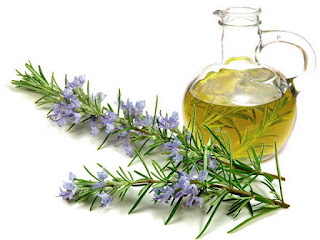Can Rosemary Oil Really Make Your Hair Grow? Here's the Deal.
Just as I was about to give up on my hopes of having longer, thicker, fuller hair, I heard some pretty convincing testimonials about a little something called rosemary oil. Rumor has it this essential oil (aka rosemary oil leaf extract, or rosmarinus officinalis leaf oil, if you're looking at an ingredient label) can supposedly prevent hair loss, reduce breakage and split ends, and improve hair growth.
Before I got my hopes up (and before I spent money on something that would end up in the pile of ineffective hair supplements under my bathroom sink), I turned to the experts to find out what's for real and what's fiction. Here, Yoram Harth, MD, board-certified dermatologist and founder of the newly launched MDhair, and Gretchen Friese, BosleyMD certified trichologist, share the science behind using rosemary oil for hair growth and what to know before giving it a try yourself.
Is rosemary oil good for hair growth?
Rosemary (yep, as in the herb on your cooked potatoes or the sprig in your fancy cocktail) is part of a family of aromatic herbs that also includes basil, lavender, and sage. According to Friese, the best quality oil is obtained from the flowering tops of the plant, and the ingredient is not only known for its fragrant aroma and uses in the kitchen but also for its stimulating, soothing, and pain-relieving properties.
To get a little technical, Dr. Harth explains that the main ingredients of rosemary oil are α-Pinene, 1,8-cineole, camphor, carnosic acid, and borneol. “These natural compounds were shown to have anti-inflammatory, antifungal, antibacterial, antioxidant, and analgesic—pain-reducing—properties,” Dr. Harth says.
Thanks to all of its properties, rosemary oil has been used for centuries to stimulate blood circulation in the scalp, prevent hair loss, slow down graying hair, and help with dry scalp and dandruff, according to Dr. Harth.
Harth. As if that list of benefits wasn't impressive enough, Dr. Harth adds that applying rosemary oil on hair strands could even reduce hair breakage and split ends. And guess what? It's got the evidence to back it up.
Dr. Harth highlights one study on mice where rosemary leaf extract was effective in DHT-related hair loss. Both Friese and Dr. Harth point to another study that compared the effects of rosemary oil extract and minoxidil (you know, like Rogaine) on people with genetic androgen-related hair loss and found similar efficacy. “That study also found the rosemary oil was more effective than minoxidil in reducing scalp irritation and itching,” Dr. Harth notes.
Can you use rosemary oil for hair loss?
Friese points out that rosemary oil isn't only potentially beneficial for hair growth, but it looks promising for hair loss, too. “Rosemary oil has been compared to minoxidil for its ability to improve circulation on the scalp and even encourage cellular turnover, which can both improve hair growth and help prevent hair loss,” Friese says. And thanks to its also anti-inflammatory properties, Friese adds that it could potentially help prevent many forms of alopecia and other hair-loss conditions as well.
How do I use rosemary oil for hair growth?
Depending on your preference, there are a couple of ways to use rosemary oil for hair regrowth—one involves diluting the pure essential oil yourself and the other involves applying a product that already contains rosemary oil. Because a DIY can be tricky (Dr. Harth warns against using too much, which could cause irritation, or getting any drips of the essential oil in your eye) it's probably the best idea and the easiest to use a product that's already formulated with rosemary oil and follow the manufacturer's instructions.
Can I apply rosemary oil directly to hair?
Because essential oils in the pure form are so concentrated, they can easily irritate your skin and are notorious for doing so.
That's why if you choose to go the DIY route, both Dr. Harth and Friese recommend you dilute the rosemary oil first in a carrier oil, such as grapeseed oil or coconut oil, or in another product, like shampoo, instead of applying it directly to your hair or scalp.
According to Dr. Harth, the optimal dilution ratio is 15 drops of rosemary oil for every 6 teaspoons of your carrier oil (olive oil, argan oil, and jojoba oil make great options, too). Once combined, massage it into your scalp and leave it for 10 minutes before washing it out. If you choose to mix it into your shampoo, Dr. Harth suggests adding two to three drops of the rosemary oil to an almond size amount of your cleanser and massaging it into your scalp for at least 3 minutes before rinsing.
Is it safe to use rosemary oil on hair every day?
If you're using rosemary oil diluted in a carrier oil, Dr. Harth recommends doing so a few times a week. Friese says you can apply the mixture up to twice a day, but you'll want to make sure to wash your hair frequently to ensure that the oils don’t clog your follicles.
A product that contains rosemary oil leaf extract, like a scalp treatment serum, can be used daily or as recommended by the manufacturer, and Dr. Harth even suggests leaving it on the scalp overnight for optimal results.
Is it safe to use rosemary oil on hair every day?
If you're using rosemary oil diluted in a carrier oil, Dr. Harth recommends doing so a few times a week. Friese says you can apply the mixture up to twice a day, but you'll want to make sure to wash your hair frequently to ensure that the oils don’t clog your follicles.
A product that contains rosemary oil leaf extract, like a scalp treatment serum, can be used daily or as recommended by the manufacturer, and Dr. Harth even suggests leaving it on the scalp overnight for optimal results.
Credit: Brooke Shunatona, Yahoo! Image Credit: Exporters India

It works!!!! Very safe and Good!!!!!
ReplyDelete